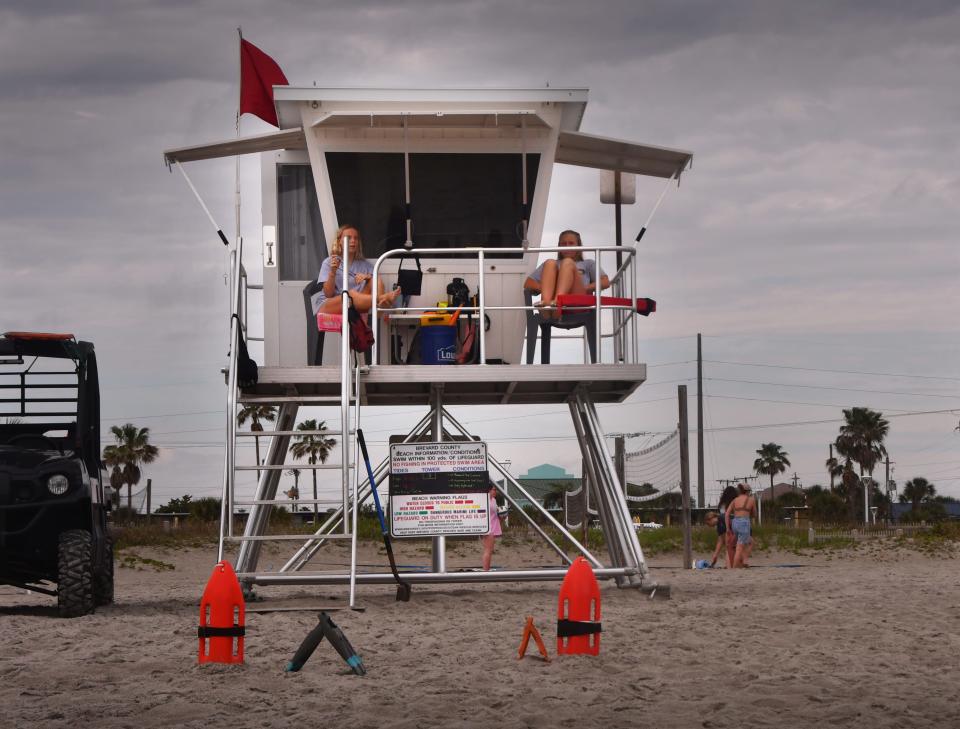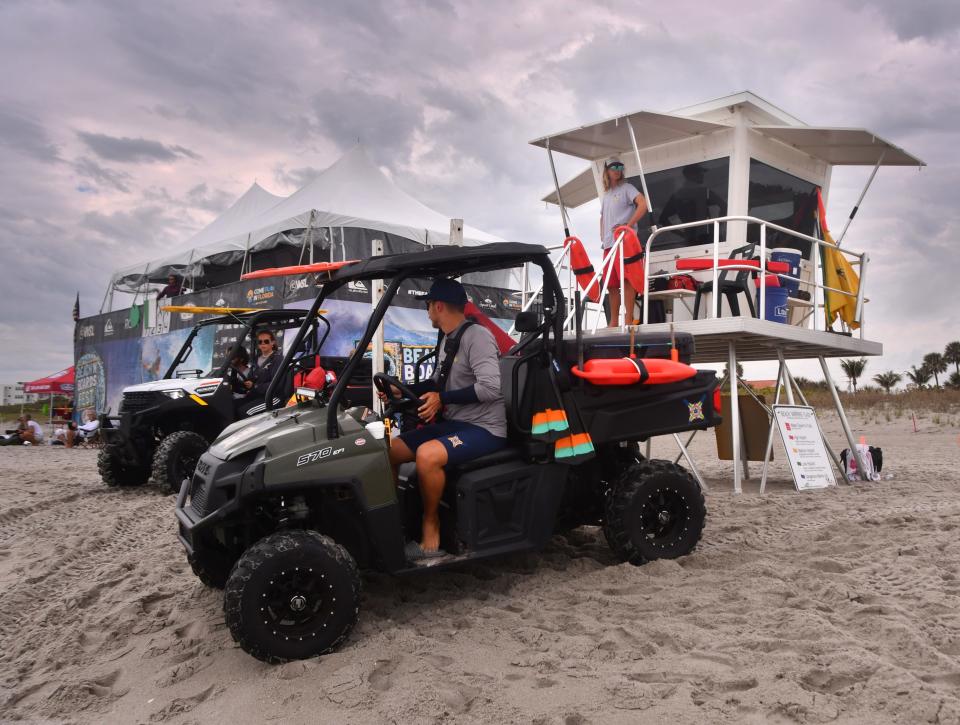Brevard threatens to stop lifeguard coverage at six sites if cities, towns don't split cost
- Oops!Something went wrong.Please try again later.
Lifeguards could disappear from some of Brevard County's busiest beaches unless the county and three beachside cities come to an agreement on who should pay for the guards.
Brevard County commissioners are backing a plan to stop providing lifeguard coverage to six beaches in Cocoa Beach, Indialantic and Melbourne Beach, unless the municipalities chip in 50% of the cost.
The municipalities thus far have declined to do so. Under the plan introduced by Commissioner John Tobia and unanimously approved during a Feb. 29 County Commission budget workshop, county lifeguard coverage could end at those city-maintained beach parks on Oct. 1, the start of the county's new budget year, unless the municipalities change their minds by July 1.
This comes in the wake of Brevard County expanding its lifeguard coverage in the current budget year, partly in reaction to 14 drownings that occurred along Space Coast beaches. Generally, drownings occurred either when lifeguards were not on duty or when there is no lifeguard coverage at all.
Tobia's proposal was not listed on the County Commission budget workshop agenda, and officials of the municipalities did not make comments during the meeting. In addition, some residents attending the workshop who wanted to address the issue did not have an opportunity to speak on it until the public comment period at the end of the nearly 3½-hour workshop — after the commission vote already had taken place.

Previous funding plan: Brevard to expand ocean lifeguard coverage using tourist tax revenue
But the move wasn't a total surprise. In May 2023, commissioners asked County Manager Frank Abbate to contact the municipalities to see if the beachside cities and towns would agree to pay half the cost of lifeguard protection at their beaches.
Tobia said he felt the county made it clear that, without such an agreement, the county no longer would provide these services, which had been primarily at the county's expense. He said the commission's vote at the budget workshop gave Abbate and other county staff direction in how to prepare the 2024-25 budget for lifeguards if the cities and towns don't change their minds about splitting the cost 50-50.
Other provisions of Tobia's plan
Among other twists in Tobia's proposal:
Up to $500,000 of the potential savings — from either the municipalities paying part of the lifeguard cost or the county not providing lifeguards for the municipalities at all — would be used to help pay for upgrades to the Florida Department of Health's complex in Viera so it could expand its clinic space and shift office space. Although a state agency, the Department of Health's Viera operation is housed in a county-owned building, and the county does provide the agency some funding.
County funding for the lifeguard program in the 2024-25 budget year would come only from the county's general fund. In the current 2023-24 budget year, some of the funding for lifeguards and the promotion of lifeguard-protected beaches was allocated from revenue generated by the county's 5% tourist development tax on hotel rooms, vacation rentals and other short-term rentals.
If the municipalities decline to pay half the cost, the county would continue to provide and pay for lifeguards in county-maintained beach parks within city limits, such as Lori Wilson Park in Cocoa Beach. But it would not provide lifeguards for city-maintained parks in city limits, such as the area near the Cocoa Beach Pier and Shepard Park in Cocoa Beach.
What beaches are affected
In all, six beach areas fall into the latter category of potentially losing lifeguard coverage. They are:
Cocoa Beach Pier in Cocoa Beach, which currently has one year-round and one seasonal lifeguard tower.
The end of Minutemen Causeway in Cocoa Beach, which currently has one year-round lifeguard tower.
Shepard Park in Cocoa Beach, which currently has one year-round and two seasonal lifeguard towers.
Tulip Avenue in Cocoa Beach, which currently has one seasonal lifeguard tower.
Boardwalk in Indialantic, which currently has one year-round and one seasonal lifeguard tower.
Ocean Avenue in Melbourne Beach, which currently has two seasonal lifeguard towers.
The annual cost of operating one full-time tower is $333,543, and the cost of one seasonal tower is $127,934.
Under Tobia's proposal, with the current level of lifeguard coverage, Cocoa Beach is being asked to pay $756,182 for the 2024-25 period, with Indialantic being asked to pay $230,738 and Melbourne Beach being asked to pay $127,934.
Tobia said other beachside communities without county-funded lifeguards could take advantage of the program, too, if they agree to pay for half the cost of lifeguards. These include Cape Canaveral, Indian Harbour Beach and Satellite Beach.
Tobia took aim at Cocoa Beach, Indialantic and Melbourne Beach during his presentation at the budget workshop on his lifeguard cost-sharing proposal. He said the communities could use money generated by their municipal parking revenue to pay for their share of the lifeguard cost. And he cited some line items in their budgets that he felt was "unnecessary spending," such as renovation of a skate park in Cocoa Beach, plants for the median along Fifth Avenue in Indialantic and decorative light poles in Melbourne Beach.
Cocoa Beach officials react
But, during a Cocoa Beach City Commission meeting last month, city commissioners rejected any move to increase the city’s annual payment for lifeguards to 50% of the total cost, which would total $756,182. Instead they voted 3-2 to support an allocation of about $89,000.
In an agenda report prepared for that meeting, the city manager's office said the tourist tax should pay for lifeguards because more than 2.5 million tourists visit Cocoa Beach each year.
"The actual residents of Cocoa Beach (as opposed to tourists) that swim in the ocean in Cocoa Beach are overall well-informed and good swimmers," the report said. "It is the tourists who typically need lifeguard services when they do not know how to deal with riptides or go into the ocean when weather conditions make it unsafe, or the tourists themselves are poor swimmers."
Cocoa Beach Mayor Keith Capizzi said he doesn't think Tobia's proposal is fair.
"It's not that we don't want to keep the people safe," Capizzi said. "We absolutely want to keep people safe in the water."
But Capizzi contends that Cocoa Beach needs the parking revenue it receives to help pay for the relatively large percentage of police calls it receives tied to tourists visiting the area. He also objects to Tobia singling out the money in the proposed Cocoa Beach city budget for repairs to the city's skate park, saying the repairs are needed to improve the safety of that facility.
Furthermore, Capizzi said many Cocoa Beach residents who don't directly benefit from tourism spending would rather the county stop promoting the city to tourists.
"The residents couldn't care less if the tourists come here," Capizzi said.
After hearing about the County Commission discussion, Cocoa Beach commissioners voted 4-1 on Thursday to not fund any of the 2024-25 lifeguard costs.

More: Brevard County moves to shift cost of lifeguard protection to municipalities
Public comment issues
Capizzi said he and other city officials would have attended the county budget workshop — if they knew Tobia was bringing up his proposal and that it would come up for a vote.
"He didn't give us a chance to even be there for it," Capizzi said. "They pushed something through without public input. This whole thing kind of stinks."
Cocoa resident Kristin Lortie was among the members of the public at the county budget workshop. She filled out a speaker card to discuss the lifeguard issue, but was not allowed to speak until the general public comment period at the end of the workshop. She then sent a formal objection to County Attorney Morris Richardson, protesting the County Commission's vote without allowing public comment beforehand.
Unlike a regular County Commission meeting, during which residents are able to put in speaker cards on all agenda items, the budget workshop gives the public only one opportunity to speak — at the end of the meeting.
Richardson said this complies with state statute, because residents will get other opportunities to address the County Commission on the lifeguard issue, including during two county budget hearings in September.
Nevertheless, Canaveral Groves resident Katie Delaney, a Republican candidate for County Commission in North Brevard's District 1, who attended the budget workshop, said she was disappointed by what she felt was a lack of transparency by not having the proposal as part of the county's online agenda package in advance of the meeting. She also felt the County Commission should have provided residents an opportunity for public comment before the vote.
What's next
Tobia said he hopes that the affected municipalities will reconsider, and agree to pay for half the cost of lifeguards at the city-maintained beach parks.
But County Commission Chair Jason Steele said: "My prediction is none of them are going to do this."
Regardless of what the municipalities do, lifeguards would remain at six county-maintained parks, three within cities and three in unincorporated Brevard. They are Cherie Down in Cape Canaveral, Lori Wilson in Cocoa Beach and Paradise in beachside Melbourne, plus these in unincorporated Brevard: Spessard Holland North, Spessard Holland South and Juan Ponce de Leon Landing. Those sites have a total of three year-round and five seasonal lifeguard towers.
Still to be determined is how the tourist tax money will be used if it is not designated for lifeguards in the next budget year. The Office of Tourism's latest budget update shows that, in the current budget year, $934,654 was transferred from its cultural marketing fund to a special fund for lifeguard-related spending.
Tobia said his preference is to have the county use tourism tax revenue that would have gone for lifeguard expenses added to the tourism marketing budget for efforts to promote Brevard County, rather than shifting it back to the cultural budget. The cultural fund is used for grants to local arts and cultural organizations and events that attract tourists to the county, as well as grants for major events like air shows and an annual powerboat race.
Dave Berman is business editor at FLORIDA TODAY. Contact Berman at dberman@floridatoday.com, on X at @bydaveberman and on Facebook at www.facebook.com/dave.berman.54
This article originally appeared on Florida Today: Popular tourist beaches in Cocoa Beach, others could lose county lifeguards

